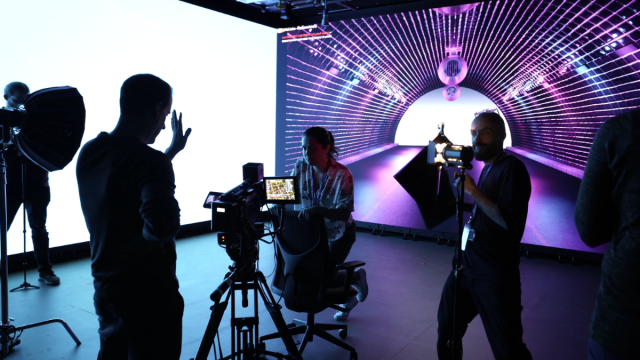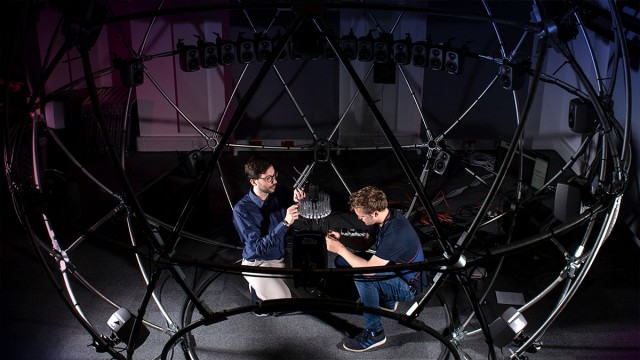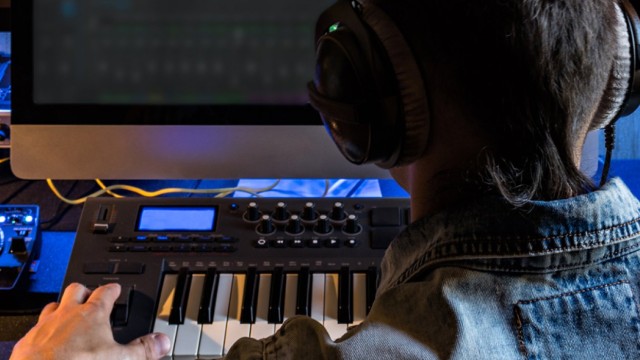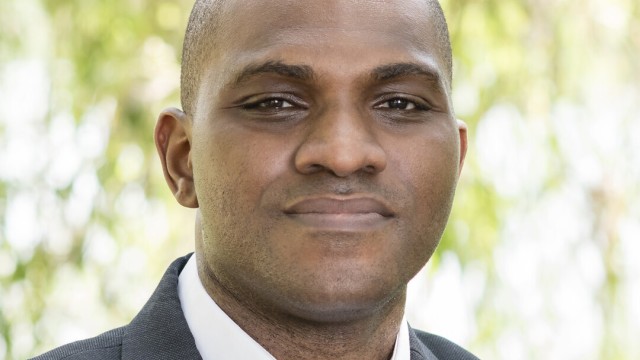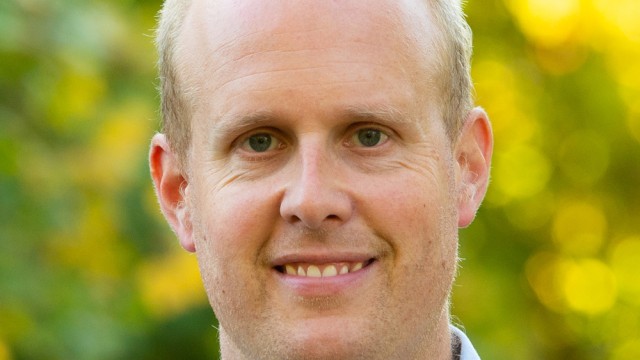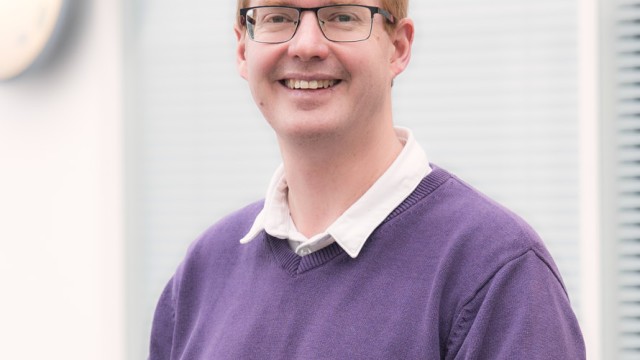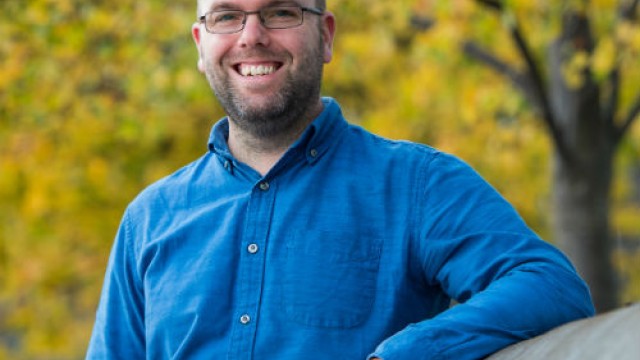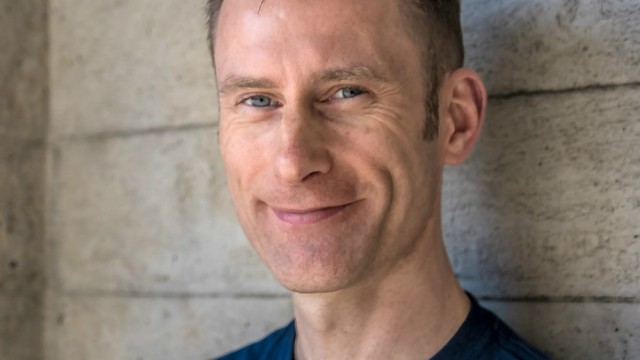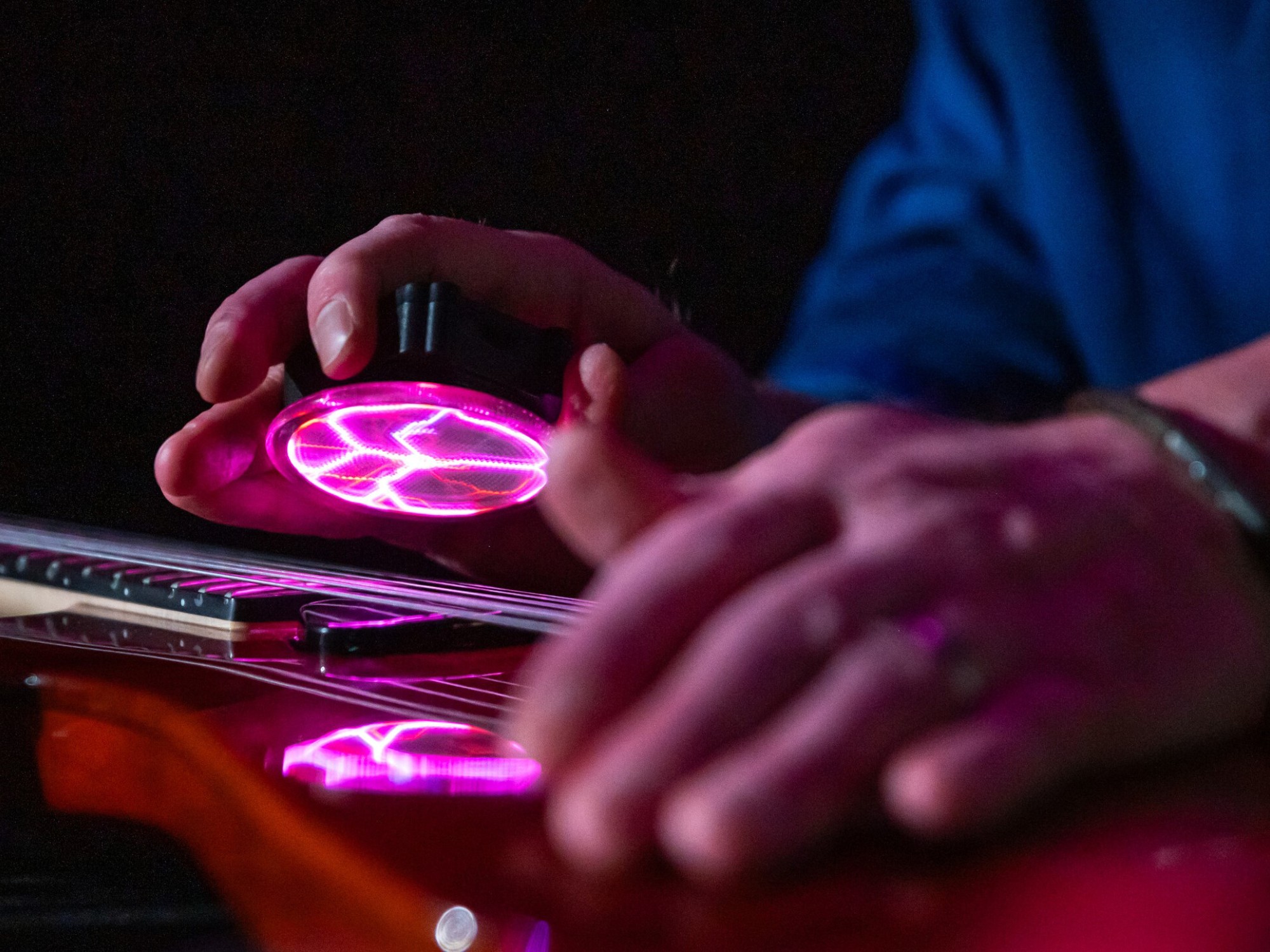
- Innovative Media Technology
PhD Innovative Media Technology
Our Innovative Media Technology PhD programme explores research into the technologies of motion picture, television and streaming media. Our academics have cutting-edge expertise in multimedia transmission and quality, computer vision and artificial intelligence.
4,138+ people have created a bespoke digital prospectus
Why choose this
programme?
- Our research aims to engage with and advance the state-of-the-art technologies in both human perceptions of video quality and applications of computer vision and artificial intelligence.
- We often collaborate with other research centres within the University, including the Centre for Vision, Speech and Signal Processing (CVSSP), the Centre for Creative Arts Technologies (C-CATS) and the Institute of Sound Recording (IoSR).
- We also work externally with industry and other research groups including BBC Research and Development and Adobe Research.
- We belong to TECHNE, an Arts and Humanities Research Council (AHRC)-funded doctoral training partnership, which provides access to comprehensive academic and professional training programmes, as well as the possibility of funding for your studies.
- Our new distance-learning route allows you to pursue doctoral research with full academic support, remote supervision, and access to online resources, without needing to relocate or interrupt your professional and/or caring commitments.
Statistics
100%
Of our Music and Media* research graduates are in employment or further education (Graduate Outcomes 2025, HESA)
Research excellence
We are ranked in the top 20 for the quality of our research outputs - Research Excellence Framework (REF) 2021
*The discipline interactive media technology belongs to
What you will study
Our Innovative Media Technology PhD will prepare you for success at each stage of your project. The structure is designed to provide intensive graduate preparation for a future career and is suitable for either part-time or full-time candidates. The normal length of study leading to a PhD is three to four years full-time . Part-time PhD study normally takes six to eight years.
You’ll begin your project with a thorough review of academic literature in relevant areas, which will lead to a critical/analytical report. The conclusions to this report will suggest an appropriate next step, which will normally be an experimental study, designed to test a hypothesis you have formulated from your literature review.
You’ll be encouraged to collaborate with researchers at universities, research establishments and industries around the world. We offer a friendly environment that nurtures openness and collaboration. You’ll also be encouraged to present your research at well-renowned national and international conferences to gain experience and establish networks with leading researchers.
You’ll be allocated two Surrey-based academic supervisors, in addition to any external collaborative supervisors. Your principal supervisor will be an expert in your area of research, and they’ll be monitoring your research progress on a regular basis. Your supervisors will help you define the initial objective and scope of your research, and to refine these as your project evolves. They’ll direct you to resources to help you learn the necessary experimental, theoretical or computing skills you need, and they’ll be able to advise you on how to complete your PhD and your thesis.
In your final two years of your PhD, you will be entirely dedicated to independent research, leading to a PhD dissertation.
Assessment
Your final assessment will be based on the presentation of your research in a written thesis, which will be discussed in a viva examination with at least two examiners.
You have the option of preparing your thesis as a monograph (one large volume in chapter form) or in publication format (including chapters written for publication), subject to the approval of your supervisors.
Location
You can study for your PhD in person here in Surrey on our Stag Hill campus or by distance learning online.
Research themes
Our research themes include:
- Multimedia transmission
- Algorithms for visual media quality
- Methodologies for human perception of visual media quality, including its application in other fields such as medical imaging and teleoperated driving
- Computer vision
- Creative arts machine learning
- Human activity recognition and human pose understanding.
Discover more about our music and media research.
See a full list of all our music and media academic staff.
Research support
The professional development of postgraduate researchers is supported by the Doctoral College, which provides training in essential skills through its Researcher Development Programme of workshops, mentoring and coaching. A dedicated postgraduate careers and employability team will help you prepare for a successful career after the completion of your PhD.
Facilities
PhD students have access to office space, computers and a range of research tools and resources, from transcription equipment to data analysis software.
You’ll have access to a state-of-the-art broadcast-standard, multi-camera TV studio, with multiple Ultra-HD cameras and opportunities to collaborate with companies specialising in video production. You also have access to GPU servers to enable real time capture and processing of images and video for machine learning.
We have doubled the facilities space for music and media. Our Performing Arts Technology Studios have been upgraded and complemented by a £1.7m investment in state-of-the-art production and media suites.
All studios, edit rooms and acoustic rooms in the new space are linked by a new Dante digital audio network, providing audio interconnection between each room, plus video interconnects for flexible configurations of the recording spaces and studios.
UK qualifications
Applicants are expected to hold a first or upper second-class (2:1) UK degree in a relevant discipline (or equivalent overseas qualification), or a lower-second (2:2) UK degree plus a good UK masters degree - distinction normally required (or equivalent overseas qualification).
English language requirements
IELTS Academic: 6.5 or above (or equivalent) with 6.0 in each individual category.
These are the English language qualifications and levels that we can accept.
If you do not currently meet the level required for your programme, we offer intensive pre-sessional English language courses, designed to take you to the level of English ability and skill required for your studies here.
Selection process
Selection is based on applicants:
- Meeting the expected entry requirements and providing all relevant documents including a satisfactory research proposal
- Being shortlisted through the application screening process
- Completing a successful interview
- Providing suitable references.
Fees per year
Explore UKCISA's website for more information if you are unsure whether you are a UK or overseas student. View the list of fees for all postgraduate research courses.
* Please note: any start date other than September will attract a pro-rata fee for that year of entry (75 per cent for January, 50 per cent for April and 25 per cent for July).
July 2026 - Full-time
- UK
- £5,006
- Overseas
- £23,400
July 2026 - Full-time with Distance Learning
- UK
- £5,006
- Overseas
- £23,400
July 2026 - Part-time
- UK
- £2,503
- Overseas
- £11,700
July 2026 - Part-time with Distance Learning
- UK
- £2,503
- Overseas
- £11,700
October 2026 - Full-time
- UK
- £5,238
- Overseas
- £24,300
October 2026 - Full-time with Distance Learning
- UK
- £5,238
- Overseas
- £24,300
October 2026 - Part-time
- UK
- £2,619
- Overseas
- £12,200
October 2026 - Part-time with Distance Learning
- UK
- £2,619
- Overseas
- £12,200
January 2027 - Full-time
- UK
- £5,238
- Overseas
- £24,300
January 2027 - Full-time with Distance Learning
- UK
- £5,238
- Overseas
- £24,300
January 2027 - Part-time
- UK
- £2,619
- Overseas
- £12,200
January 2027 - Part-time with Distance Learning
- UK
- £2,619
- Overseas
- £12,200
April 2027 - Full-time
- UK
- £5,238
- Overseas
- £24,300
April 2027 - Full-time with Distance Learning
- UK
- £5,238
- Overseas
- £24,300
April 2027 - Part-time
- UK
- £2,619
- Overseas
- £12,200
April 2027 - Part-time with Distance Learning
- UK
- £2,619
- Overseas
- £12,200
- Annual fees will increase by 4% for each year of study, rounded up to the nearest £100 (subject to legal requirements).
Additional costs
There are additional costs that you can expect to incur when studying at Surrey.
Funding
A Postgraduate Doctoral Loan can help with course fees and living costs while you study a postgraduate doctoral course.
Studentships
Browse our frequently updated list of funded studentships open for applications.
Application process
Applicants should contact potential supervisors before submitting an application via the website. Please refer to section two of our application guidance.
Apply online
To apply online first select the course you'd like to apply for then log in.
Select your course
Choose the course option you wish to apply for.
Sign in
Create an account and sign into our application portal.
The closing date is the last day this month is available for applications, but if you are applying through a studentship you must follow the deadline on the advert to be eligible.
ApplyThe closing date is the last day this month is available for applications, but if you are applying through a studentship you must follow the deadline on the advert to be eligible.
ApplyThe closing date is the last day this month is available for applications, but if you are applying through a studentship you must follow the deadline on the advert to be eligible.
ApplyThe closing date is the last day this month is available for applications, but if you are applying through a studentship you must follow the deadline on the advert to be eligible.
ApplyThe closing date is the last day this month is available for applications, but if you are applying through a studentship you must follow the deadline on the advert to be eligible.
ApplyThe closing date is the last day this month is available for applications, but if you are applying through a studentship you must follow the deadline on the advert to be eligible.
ApplyThe closing date is the last day this month is available for applications, but if you are applying through a studentship you must follow the deadline on the advert to be eligible.
ApplyThe closing date is the last day this month is available for applications, but if you are applying through a studentship you must follow the deadline on the advert to be eligible.
ApplyThe closing date is the last day this month is available for applications, but if you are applying through a studentship you must follow the deadline on the advert to be eligible.
ApplyThe closing date is the last day this month is available for applications, but if you are applying through a studentship you must follow the deadline on the advert to be eligible.
ApplyThe closing date is the last day this month is available for applications, but if you are applying through a studentship you must follow the deadline on the advert to be eligible.
ApplyThe closing date is the last day this month is available for applications, but if you are applying through a studentship you must follow the deadline on the advert to be eligible.
ApplyThe closing date is the last day this month is available for applications, but if you are applying through a studentship you must follow the deadline on the advert to be eligible.
ApplyThe closing date is the last day this month is available for applications, but if you are applying through a studentship you must follow the deadline on the advert to be eligible.
ApplyThe closing date is the last day this month is available for applications, but if you are applying through a studentship you must follow the deadline on the advert to be eligible.
ApplyThe closing date is the last day this month is available for applications, but if you are applying through a studentship you must follow the deadline on the advert to be eligible.
ApplyAfter registration
Students are initially registered for a PhD with probationary status and, subject to satisfactory progress, subsequently confirmed as having PhD status.
About the University of Surrey
Need more information?
Contact our Admissions team or talk to a current University of Surrey student online.
Code of practice for research degrees
Surrey’s postgraduate research code of practice sets out the University's policy and procedural framework relating to research degrees. The code defines a set of standard procedures and specific responsibilities covering the academic supervision, administration and assessment of research degrees for all faculties within the University.
Download the code of practice for postgraduate research admissions (PDF).
Terms and conditions
When you accept an offer to study at the University of Surrey, you are agreeing to follow our policies and procedures, student regulations, and terms and conditions.
We provide these terms and conditions at the offer stage and are shown again at registration. You will be asked to accept these terms and conditions when you accept the offer made to you.
View our generic registration terms and conditions (PDF) for the 2025/26 academic year, as a guide on what to expect.
Disclaimer
This online prospectus has been published in advance of the academic year to which it applies.
Whilst we have done everything possible to ensure this information is accurate, some changes may happen between publishing and the start of the course.
It is important to check this website for any updates before you apply for a course with us. Read our full disclaimer.
